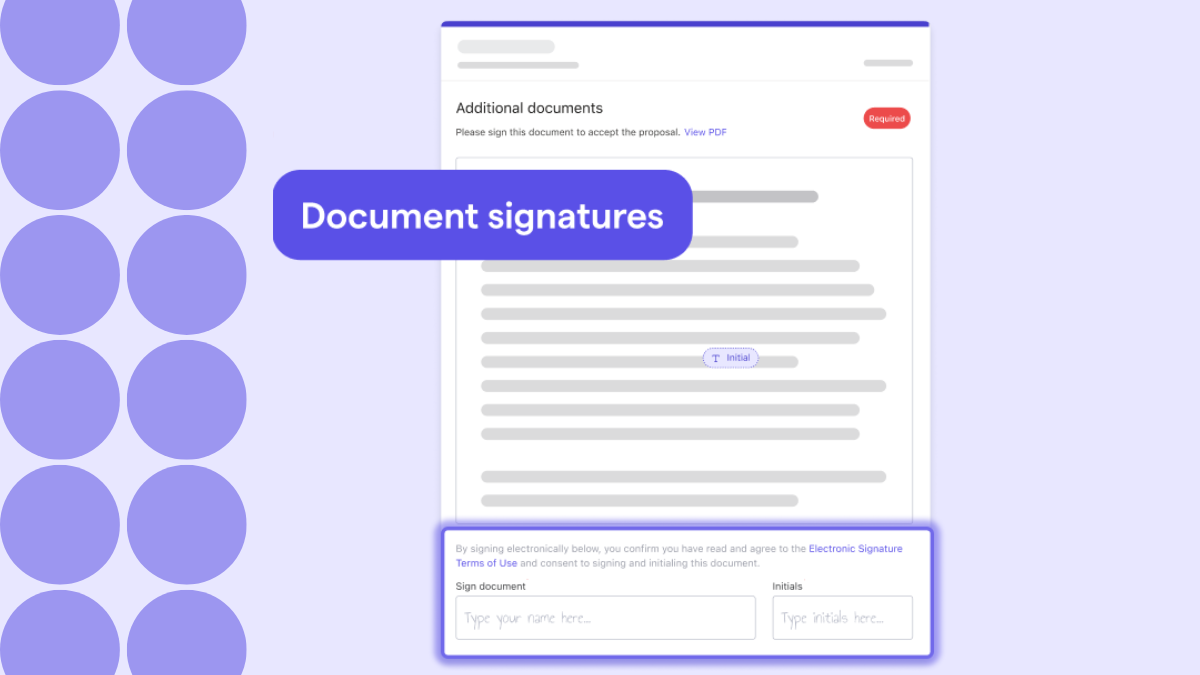How to create a contract template for your marketing agency

Winning new clients is exciting, but securing those partnerships requires more than a handshake; it starts with a well-structured contract that protects both parties. A clear, legally sound agreement sets expectations, prevents misunderstandings, and ensures you get paid on time.
But creating contracts for each new client from scratch is easier said than done. It’s a time-consuming and tedious task that takes your focus away from other aspects of your business—and may even put it at risk. Without the right legal language, your marketing agency can face legal disputes, delayed payments, and other costly problems.
So, how can you simplify this process without cutting corners? A customizable contract template provides a structured framework that you can easily adapt for each client, saving time while safeguarding your business.
Key takeaways
- Using a customizable contract template saves time and cuts down on legal headaches, giving your agency a solid starting point for every client agreement.
- Free or generic templates might seem convenient, but they often miss the mark when it comes to covering important details like scope creep, IP rights, and payment terms.
- Clearly outlining your services, deliverables, timelines, and who owns what helps set expectations early and keeps projects running smoothly.
- Don't skip the legal stuff—confidentiality, IP ownership, liability limits, and how to handle disputes are all key to protecting your agency if something goes sideways.
- Set boundaries on revisions and out-of-scope work upfront, so you’re not stuck doing extra tasks without getting paid for them.
- Ignition makes contract creation and management simple, with ready-to-edit templates, e-signatures, and built-in tools to track renewals and automate payments.
Contract template examples for marketing agencies
Marketing services vary widely across agencies and clients, so a one-size-fits-all contract template won’t cut it. Instead, agencies need specialized templates that align with their unique needs. The right template streamlines the contracting process and helps ensure clarity.
Here are a few examples of service-specific contract templates agencies may need:
Templates at your fingertips
Win and retain clients with Ignition’s ready-to-go proposal templates that give your proposals the professional edge.
Ignition’s fully customizable templates allow you to easily incorporate legally approved verbiage unique to your agency, helping you create contracts that are both professional and legally sound.
Important note: Ignition’s templates are designed for demonstration and inspiration. They may not meet the specific legal or compliance requirements for your business or industry. Before using them, consult with your legal professional to ensure they align with your needs.
Why you should build your own marketing agency contract template
Creating a contract template tailored to your agency’s services ensures clear terms for clients, protects your business from disputes, and eliminates legal uncertainty. While free marketing agreement templates are easy to find online, using one without customization options can lead to problems.
- Legal and financial risk: Generic templates may not comply with industry regulations or local laws, leaving your agency vulnerable to disputes or financial losses.
- Lack of customization: Many free templates don’t address specific agency needs, such as intellectual property (IP) rights, scope creep, or payment terms.
- Ambiguities and loopholes: Poorly structured agreements can lead to misunderstandings, delayed payments, or even breach of contract disputes.
- Missed protections: Free contract templates often lack key clauses like termination rights, indemnification, or liability limitations, which are crucial for protecting your business.
Creating a contract from scratch can be daunting, but starting with a well-structured template and adapting it to your agency’s needs offers a more efficient and reliable solution. Ignition simplifies this by offering legally sound, industry-specific templates to personalize, save, and reuse.
With Ignition, you can create a library of contract templates tailored to your services, ensuring consistency and compliance across all client agreements, while streamlining contract management and reducing administrative burden.
Ready to simplify contract management?
Ignition’s templates make the process easy. Get started today to see how.
Key components to include in a contract template
The exact details included in your contract template will depend on your agency’s services and operational requirements. However, the following essential elements are key to creating a clear and enforceable agreement.
Services and scope of work
Outline the services your agency will provide, such as search engine optimization (SEO), pay-per-click (PPC) marketing campaigns, or social media marketing. If your agency develops a marketing plan as part of its services, specify what it includes—campaign strategy, audience research, and content calendars—to set clear expectations and prevent scope creep.
Be specific about services, deliverables, and any limitations to ensure clarity and prevent potential conflicts. Clearly defining the scope of work keeps both parties on the same page and helps avoid misunderstandings or unexpected requests for additional services beyond the original agreement.
Scope creep management
Even with a well-defined scope, additional client requests can arise. Your contract should specify how out-of-scope work will be handled, including the process for approvals and additional billing. Setting these expectations upfront helps prevent disputes and ensures your agency is fairly compensated for extra work.
Deliverables and timelines
Clearly detailing project deliverables helps create a mutual understanding with clients. This section should outline the exact items you’ll deliver, such as white papers, website graphics, social media posts, blog content, and project timelines. Including start dates, final deadlines, and key milestones helps keep projects on track and ensures transparency.
Performance metrics and revisions
Clients want to see measurable results, so make sure you define the performance metrics you’ll use to determine success, such as conversion rates, traffic increases, or click-through rates.
Additionally, outlining the number of revisions included per deliverable helps prevent excessive requests that can lead to scope creep. Establishing these terms from the start ensures a smoother workflow, timely approvals, and fewer payment delays.
Client responsibilities
A contract doesn’t just define your agency’s obligations and establishes what the client is responsible for to keep projects on track. This section should specify their role in the process, like providing timely feedback or giving approvals. Clarifying these requirements helps prevent setbacks and ensures seamless collaboration.
Ownership
Who owns deliverables once they’re completed and in the client’s hands? If ownership terms aren’t clearly defined, disputes can arise, potentially leading to costly legal complications or a strained client relationship.
To avoid confusion, your marketing services agreement should specify whether the client gains full ownership, if your agency retains rights to any elements, or if usage is subject to certain conditions.
For example, if your agency develops proprietary marketing strategies or processes, you may want to retain ownership while granting the client full rights to the finished product. Laying out these details upfront ensures both parties are aligned on expectations.
Contract duration and termination
Your contract should define the length of your business relationship—whether ongoing or for a fixed term, such as three months or a year. Clearly specify the effective date and outline any renewal terms if applicable.
Since agreements don’t always go as planned, establish a clear termination process from the start. Define the required notice period, how notice should be given (e.g., email, written letter), and what happens to incomplete work, outstanding payments, or project handoffs if the contract ends early. Setting these terms in advance helps prevent disputes and facilitates a smooth transition if either party needs to move on.
Legal considerations
One of the most complex aspects of creating a contract is enforcing necessary legal protections. The specific legal and compliance details will depend on your industry, location, and business structure, but the following considerations are relevant to many marketing agency agreements.
Confidentiality clauses
If your agency or client handles sensitive information, such as trade secrets, proprietary information, or strategic plans, confidentiality clauses or non-disclosure agreements (NDAs) are essential. Clearly define the subject matter covered under confidentiality, specifying what details are protected, who is bound by the agreement, and how long the obligation remains in place.
It’s also important to outline what happens if confidential information is leaked. Your contract should specify repercussions, such as financial penalties or legal action, in the event of a breach of contract.
Intellectual property rights
If your agency creates content, designs, or other intellectual property (IP), ownership rights should be clearly established. Your contract should define whether IP is retained by your agency, the client, or in rare cases, a subcontractor or independent contractor working on the project.
If a client owns IPs, such as trademarks or brand assets, your contract should outline how, where, and when your agency is permitted to use them, including any restrictions on modifications or distribution.
Limitation of liability
Legal disputes, such as breach of contract claims, can be costly. A limitation of liability clause sets a cap on the amount of damages one party can seek in the event of a dispute.
This section might define the maximum amount of compensation allowed, outline exclusions, and establish both parties’ financial exposure. Well-defined terms help mitigate risk and prevent excessive legal claims.
Exclusivity
Some marketing agency contracts include exclusivity clauses that restrict one party from doing business with certain other parties. For example, a client may request that your agency not provide services to their direct competitors during or after your engagement.
If you include exclusivity terms, be specific about the scope, duration, and any exceptions. Without clear boundaries, these clauses can unintentionally limit your agency’s ability to take on future clients.
Dispute resolution
Even with careful wording in a contract, disputes can arise in agency-client working relationships. A dispute resolution clause outlines how conflicts should be handled through mediation, arbitration, or litigation.
Establishing a resolution process upfront can prevent disputes from escalating into expensive, drawn-out legal battles.
Governing law
Your contract should specify which state or country’s governing law will apply if legal action or arbitration becomes necessary. This is important because it determines which legal framework will be used to interpret the contract and resolve disputes.
By clearly stating the governing law, both parties can avoid confusion and ensure they understand their rights and responsibilities from the start.
Pricing and payment terms
Marketing contracts should clearly outline pricing structures, detailing whether you charge flat fees, hourly rates, or retainer-based prices. This section should also cover payment terms, including due dates, accepted payment methods, and any specific conditions related to billing cycles.
Payment schedule and late fees
Even with clear payment terms, delays can happen. In joint ventures with clients, outlining payment schedules, late fees, and refund policies helps maintain steady cash flow and financial protection if issues arise. For example, your contract might include the amount your agency will charge for late payments and when these fees will go into effect.
Signing
This final section of your contract should include designated spaces for both parties to sign, confirming agreement to the contract’s terms and conditions. Whether signed electronically through e-signature software or in ink, this step ensures the contract is legally binding and enforceable.
Manage contracts from start to finish with Ignition
A strong contract sets clear expectations, protects your agency, and fosters a smooth working relationship with clients. However, creating and managing contracts efficiently is just as important as having the right terms in place.
Ignition simplifies contract management with customizable, legally sound templates that fit your agency’s unique needs. Our platform streamlines everything from drafting and sending agreements to securing e-signatures, ensuring contracts are finalized efficiently and stored for easy access.
With tools for tracking renewals, enforcing payment terms, and automating invoicing and payments, Ignition helps you finalize deals with confidence and maintain steady cash flow—all while reducing administrative overhead.
Smoother agreements, happier clients.
Get your client relationships off on the right start with Ignition’s customizable marketing contract templates.


